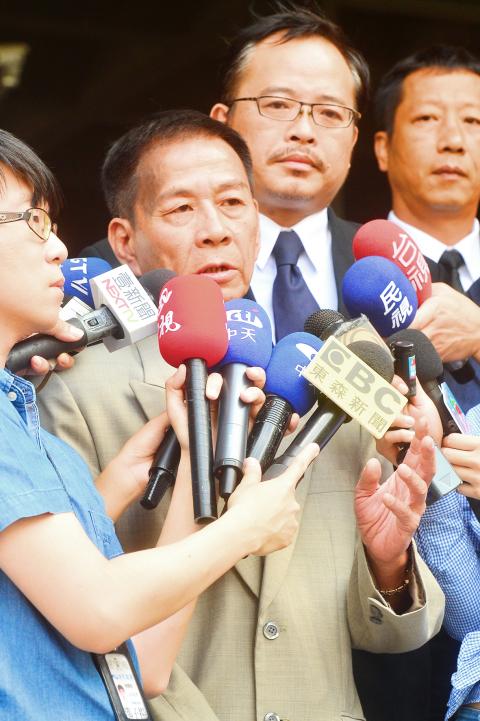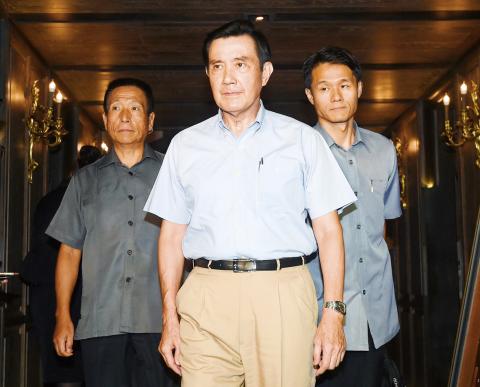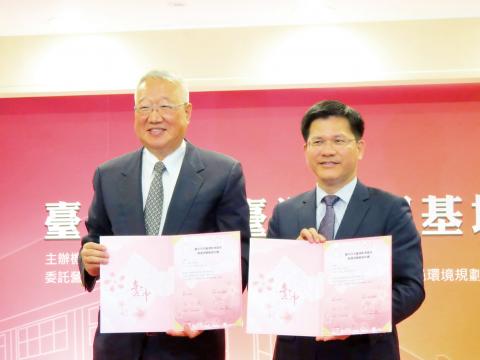Weng Ping-yao (翁炳堯) yesterday said he was instructed by former president Ma Ying-jeou (馬英九) and Cheng Uei Precision Industry Co (CUPI, 正崴) chairman Gou Tai-chiang (郭台強) to kill then-Chinese Nationalist Party (KMT) legislator Alex Tsai (蔡正元) amid a power struggle a decade ago as groups fought for control of the party’s assets.
Weng — who was convicted of firing a gun outside Tsai’s office in Taipei’s Nangang District (南港) on July 28, 2007 — said that KMT officials promised him NT$320 million (US$10.56 million at the current exchange rate) to kill the lawmaker.
He implicated Ma and Gou — who is the younger brother of Hon Hai Precision Industry Co (鴻海精密) chairman Terry Gou (郭台銘); — as well as Lor Yu-chen (羅玉珍), the wife of Gou Tai-chiang; former Central Motion Picture Corp (CMPC, 中影) vice president Chuang Wan-chun (莊婉均); and KMT stalwart Lee Chuan-chiao (李全教).

Photo: Wang Yi-sung, Taipei Times
Accompanied by attorney Chou Wu-jung (周武榮), Weng went to the Taipei District Prosecutors’ Office, saying he wanted to confess to perjury and to ask prosecutors to reopen the investigation of the shooting.
Weng said he has evidence regarding “the plot to bump off Alex Tsai.”
After telling reporters that he would file a lawsuit against “the masterminds of the plot,” Weng entered the prosecutors’ office.

Photo: Liao Chen-huei, Taipei Times
He was released later in the day, with instructions not to leave his residence.
Weng told reporters that he was just “a hired gun, a small potato” in the case and wanted the truth to come out.
The KMT at the time of the shooting was electing members to its Central Standing Committee and other executive positions.

Photo: Su Chin-feng, Taipei Times
There was an intense power struggle over party assets, with the sale of CMPC and other KMT-controlled media companies at the center of a clash between Ma, who was president and KMT chairman at the time, and Tsai, who was the chairman of CMPC at the time, Weng said.
“Tsai refused to resign as CMPC chairman, so Ma struck a deal with Gou Tai-chiang, Lor and Chuang according to which those three would take control of CMPC,” Weng said.
“I was instructed to bump off Tsai,” he said. “It was reasoned that if Tsai was killed, then Gou Tai-chiang would become CMPC chairman.”
Weng said that Lee, who at the time was speaker of the Tainan County Council, brokered the deal to hire him to carry out the assassination.
Weng has a checkered past as a gang member in Tainan and has managed companies in Vietnam.
“I was promised a payment of NT$320 million if I killed Tsai,” he said. “That amount was agreed upon, as it was 10 percent of CMPC’s assessed value of NT$3.2 billion.”
He said the deal broke down when he was asked to also kill Wu Chien-pao (吳健保), a leading KMT figure in Tainan, but was convicted for his involvement in an underground baseball gambling syndicate.
With the deal breaking down, Weng only fired shots at Tsai’s office, he said.
He said he was cheated out of money, only receiving NT$20 million.
“During the trial, I gave false accounts and mislead prosecutors to protect Ma, Gou Tai-chiang and others, but now I want to clear up the facts of the case and let the public know the real masterminds behind the plot,” Weng said.
Ma’s office spokeswoman Hsu Chiao-hsin (徐巧芯) said there is no factual basis and no evidence to Weng’s allegations, adding that Ma had nothing to do with the shooting incident at Tsai’s office.
“It is absurd to the extreme that Ma should be a defendant in this case,” Hsu said. “Ma was not involved, but some people just want to stir up trouble.”

Right-wing political scientist Laura Fernandez on Sunday won Costa Rica’s presidential election by a landslide, after promising to crack down on rising violence linked to the cocaine trade. Fernandez’s nearest rival, economist Alvaro Ramos, conceded defeat as results showed the ruling party far exceeding the threshold of 40 percent needed to avoid a runoff. With 94 percent of polling stations counted, the political heir of outgoing Costa Rican President Rodrigo Chaves had captured 48.3 percent of the vote compared with Ramos’ 33.4 percent, the Supreme Electoral Tribunal said. As soon as the first results were announced, members of Fernandez’s Sovereign People’s Party

EMERGING FIELDS: The Chinese president said that the two countries would explore cooperation in green technology, the digital economy and artificial intelligence Chinese President Xi Jinping (習近平) yesterday called for an “equal and orderly multipolar world” in the face of “unilateral bullying,” in an apparent jab at the US. Xi was speaking during talks in Beijing with Uruguayan President Yamandu Orsi, the first South American leader to visit China since US special forces captured then-Venezuelan president Nicolas Maduro last month — an operation that Beijing condemned as a violation of sovereignty. Orsi follows a slew of leaders to have visited China seeking to boost ties with the world’s second-largest economy to hedge against US President Donald Trump’s increasingly unpredictable administration. “The international situation is fraught

MORE RESPONSIBILITY: Draftees would be expected to fight alongside professional soldiers, likely requiring the transformation of some training brigades into combat units The armed forces are to start incorporating new conscripts into combined arms brigades this year to enhance combat readiness, the Executive Yuan’s latest policy report said. The new policy would affect Taiwanese men entering the military for their compulsory service, which was extended to one year under reforms by then-president Tsai Ing-wen (蔡英文) in 2022. The conscripts would be trained to operate machine guns, uncrewed aerial vehicles, anti-tank guided missile launchers and Stinger air defense systems, the report said, adding that the basic training would be lengthened to eight weeks. After basic training, conscripts would be sorted into infantry battalions that would take

GROWING AMBITIONS: The scale and tempo of the operations show that the Strait has become the core theater for China to expand its security interests, the report said Chinese military aircraft incursions around Taiwan have surged nearly 15-fold over the past five years, according to a report released yesterday by the Democratic Progressive Party’s (DPP) Department of China Affairs. Sorties in the Taiwan Strait were previously irregular, totaling 380 in 2020, but have since evolved into routine operations, the report showed. “This demonstrates that the Taiwan Strait has become both the starting point and testing ground for Beijing’s expansionist ambitions,” it said. Driven by military expansionism, China is systematically pursuing actions aimed at altering the regional “status quo,” the department said, adding that Taiwan represents the most critical link in China’s